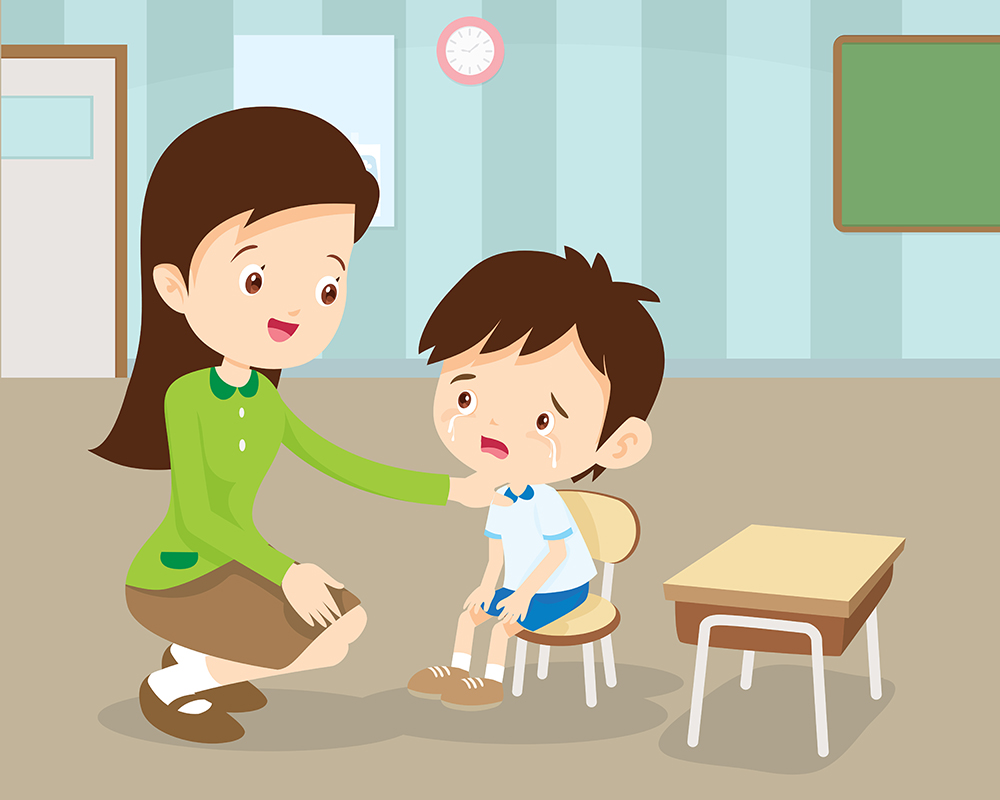
Niwat singsamarn/Shutterstock
.
As youth welfare professionals we have all heard it, “I need to protect my children and not talk with them about their father’s death,” or “I don’t want to bring them to talk to somebody about their dad’s death. It would only stir things up and they seem to be doing so well.” Both these sentiments can be detrimental to children and adolescents who are trying to cope with the loss of a parent, sibling or other close person.

Irene McClatchey
Children and adolescents need their loss acknowledged. When the adults in the child’s or adolescent’s life avoid talking about the lost person, often the message the children hear is that the loss is insignificant — which makes them doubt their own feelings and reactions. Also, adults are misguided in believing that talking about the loss will “stir things up” — it is the loss that stirs things up, not talking about it. As a matter of fact, it is open communication about the loss that will be most helpful to grieving children and adolescents.
The following 10 tips for helping grieving children and teens and their caregivers derive from my own practice with bereaved children. I have held healing camps for children and adolescents bereaved of a parent or sibling three to four times a year for the past 24 years. Over this time span it has become evident that children need to have their grief acknowledged and a space to have their feelings listened to. Avoiding talking about it only prolongs the grieving period and makes the process a lonely one for a child or adolescent for whom support is vitally important during this time.
- Make yourself available to listen: Allow the child or adolescent to grieve. Listen to their feelings surrounding the loss with empathy and without judgment. This is often difficult for a parent who is also experiencing the loss. It is difficult for a parent to hear their child’s grief and it is difficult for the child to share with a parent in an attempt to “protect” the parent. Therefore, as a youth welfare professional it is vital for you to partake in this role, but at the same time encourage child and caregiver to share with each other while assuring the child that they are not responsible for their caregiver’s pain.
- Give reassurance that there is no right or wrong way to grieve. All grief is individual and needs to be respected. Expect anger, irritability, sadness, guilt, avoidance, repression, withdrawal or acting out behavior. Do not reassure, advise or minimize.
- Use the words “death,” “dying” and not euphemisms. Use of euphemisms is confusing to children and contributes to the stigma of talking about death. Death is a natural part of living. Instead of saying, “We have lost Grandpa,” or “Mom has gone to sleep,” use the expressions, “Grandpa died” or “Mom has died.”
- Teach coping skills. Children and adolescents need to be able to soothe themselves when alone. Simple techniques include deep/mindful breathing, self-talk, relaxation techniques, writing in a journal, listening to “soft” music, etc. At camp we tell campers to use what is helpful to them as long as it does not hurt them, others or any property.
- Provide play experiences to help relieve tension. Children cannot tolerate strong feelings for an extended period of time. Play is simply another way for children to express their feelings and helps soothe them. Younger children in particular may find it easier to share their ideas and feelings about the event through nonverbal activities such as drawing.
- Reassure the child that they are not responsible for the death by clarifying how the death occurred. Children will often assume responsibility for the death. They will make up reasons for how they caused the death by something they said or did. This is called magical thinking.
Hiding facts, such as suicide and drug overdose, is not helpful to children. If a lie has been told, the child will eventually find out, and this will create trust issues and anger. In cases where facts have been hidden from the child, encourage the caregiver to tell the truth beginning with, “Remember how I told you your dad died in an accident at work. Well, this is not what happened. I said this because I thought this was the right thing to do to protect you. Now I have learned otherwise. I need to tell you what really happened. Your dad took his own life. What questions do you have?”
Suicide is related to an illness, depression, which may have a deadly outcome just like cancer and lung disease. Also, avoid saying “commit suicide” as this denotes an illegal action, which it is not. Such words only contribute to the needless stigma surrounding suicide. - Assure the child that they are safe. Children and adolescents need to feel safe. Assure them that what they are sharing will stay between you and them unless they have plans to hurt themselves or others. Encourage their caregivers to provide stability and structure to help with feelings of safety. Use regular schedules for activities such as eating and bedtime. Discipline also helps bereaved children feel safe. Encourage caregivers to set rules and follow through with consequences if warranted. Discipline needs to be age appropriate and while being too lenient has negative consequences, so does being too strict.
- Encourage the parent to not let the child assume responsibilities beyond their years. Children are not miniature grown-ups. A 10-year-old male cannot become the “man of the house” and a 12-year-old girl cannot “mother” her younger siblings. While people may mean well by making these comments, children take them literally. For them, it becomes an overwhelming expectation.
- Don’t make false promises that nothing will happen to a surviving parent. Children worry about their surviving parent. Children are smart enough to know that such a promise is false and wonder what else they are being told is not true. Instead, encourage the caregiver to take care of themselves and to discuss with the child who will take care of them if something should happen.
- Refer to peer support. Peers are often vital in a child’s or adolescent’s process to accepting a new normal. Knowing that another child their age has also suffered a similar loss normalizes the child’s grief experience and provides comfort. Refer to a peer support group or a bereavement camp — several have popped up over the last couple of years. Before referring to anyone, make sure that the group or camp use evidence- based interventions and can show you positive outcome studies.
Communicating with the bereaved child about the loss is paramount. Children and adolescents who have the support of adults and peers fare better in the grieving process. The National Alliance for Grieving Children is an organization dedicated to helping grieving children and adolescents. It provides resources, support and ideas for parents, families, youth welfare professionals and others who care about grieving children and adolescents.
Irene Searles McClatchey is an associate professor and director of the Master of Social Work Program at Kennesaw State University. She is the founder of Camp MAGIK, a healing camp for bereaved children and teens that serves 200-plus children and their families a year.































